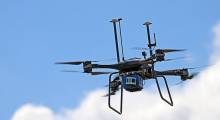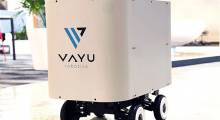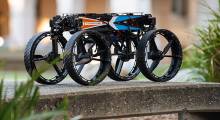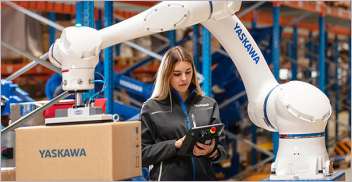As donation and transplantation needs continue to rise across the U.S., aerial drones promise a faster, safer, and more efficient way to transport organs and blood supplies. MissionGO and The Living Legacy Foundation of Maryland today announced a successful flight demonstration.
“About 20 lives are lost every day waiting for an organ transplant,” said Charlie Alexander, president and CEO of The Living Legacy Foundation of Maryland (LLF). “As the demand of blood shipment to laboratories increases, it is imperative more than ever that we support and facilitate these types of initiatives in order to decrease the total turnaround time for donor matching results and get recipients the organs they need in time.”
The LLF is the state of Maryland's organization responsible for organ, eye, and tissue donation services. Baltimore, Md.-based MissionGO uses unmanned aircraft to provide improved reliability, reduced costs, and increased transparency to sectors including healthcare and critical infrastructure.
A medical need for speed
There are currently about 3,000 Marylanders and more than 100,000 people nationwide waiting for a life-saving transplant. One donor can save up to eight people through organ donation and enhance more than 75 lives through tissue donation, the LLF said.
Blood testing and travel time are integral parts of the organ donation and transplantation process, but many variables threaten the viability of specimens. As a result, transporting blood in a safe, timely and effective manner is critical, said MissionGO.
Currently, the LLF sends blood specimens to a minimum of three different labs by ground courier that are most frequently across a 7.1-mi. distance, which takes about 38 minutes for just one shipment. This process is also subject to heavy traffic, accidents, and many other unpredictable road-related factors.
Once received, the LLF, donor hospitals, and partner laboratories within 150 to 250 miles must create extremely efficient, logistical solutions to rapidly and rigorously test the specimen. They must ensure that there no communicable diseases are present, identify a match, and provide transport to the transplant hospital for the surgical procedure.
“We are passionate about saving and enhancing lives through donation, while honoring the legacy and generosity of our donors and their families,” said Alexander. “Continuing to make these medical advancements furthers our mission to save more lives, and we look forward to finding more innovative ways to help those in need.”
MG Velos 100 delivery system takes flight
MissionGO recognized that a better method was needed. With technology partners MediGO and AlarisPro, the company designed the MissionGO MG Velos 100, a fully integrated system to track, deliver, and monitor the entire logistics process. They then compared the speed and reliability of delivering blood specimens via ground transport versus unmanned aircraft.
The test flight took place on Aug. 10 using the MG Velos 100, a fully autonomous, high-speed unmanned aircraft system (UAS) for blood and organ delivery. It featured an approximately 292% time improvement over ground transportation, according to MissionGo and the LLF.
At one of MissionGO's Maryland test sites, the UAS flew a circuit route over a 5.3-mi. course representing the direct-line flight path for the blood delivery. Traveling at approximately 50 mph over a 60-minute period, the UAS completed four total blood delivery shipments.
Throughout the process, MediGO provided logistical information to all shipment stakeholders, including a chat channel for ongoing communication between the flight team to monitor each step of the specimen’s journey.
“When it comes to donation, specimen testing, and transplantation, every second counts, and we found there was a lot of room for improvements within the current process,” said Frank Paskiewicz, executive vice president of UAS Cargo Operations at MissionGO. “For donation to be possible, labs must receive blood as quickly as possible so it can be matched with a waiting recipient.”
“We’re thrilled that the results of this flight and fully integrated UAS cargo-delivery solution will help accelerate the donation process and potentially save more lives than ever before,” he added.
MissionGO works with stakeholders
MissionGO said it is working closely with the U.S. Federal Aviation Administration (FAA) to advance the MG Velos 100 through the certification process. The company said it will be uniquely positioned to offer transplant stakeholders the only UAS capable of routine medical cargo delivery in urban environments.
Using the MG Velos 100, organ procurement organizations (OPOs), hospitals and laboratories could autonomously deliver specimens over all traffic and geographical limitations, said MissionGO.
In addition, MediGO will offer visibility and transparency, and AlarisPro will provide fleet and maintenance management, covering every detail of multi-modal organ and blood shipments, it said. Doctors and clinicians can then focus on their mission of saving lives rather than logistics, said MissionGO.
“We’re grateful to have the opportunity to partner with the LLF, a forward-leaning, technology-focused OPO that is leading the transplant community into the future,” said transplant surgeon Joseph Scalea, co-founder and chief medical officer of MediGO. “Now, all stakeholders can have eyes on the shipment through its entire journey to final delivery. The confidence and efficiency this brings to medical teams is a game-changer for the industry, and with our partners at MissionGO, the future of transplant logistics is here.”
Article topics
Email Sign Up
















